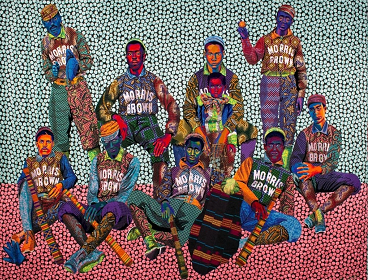
Man to Man: Masculinity, Gender-based violence, women and the other pandemics
Written by Mr khanya Sishi
January, 27, 2021
“Men are trash
Black lives matter vs
not all men are trash
all lives matter”
Either than the tiring COVID pandemic plaguing our lives in 2020, South Africans were faced with the gruesome headlines of gender-based violence fatalities. Two in particular stand out, that of Naledi Phangindawo and Tshegofatso Pule. The death of these two young women hit so hard and so close to home that the only response South African women could give was the question: “am I next.” The question expressed an anxiety not even a pandemic could distract.
As we speak the cases of domestic violence are on a rise. For many women, the advice to ‘stay home’ in an effort to flatten the curb has shown a possible death trap. It is clear that for many, whether they are out of the home or confined to its four walls, they are confronted with a deadly plague…
When the news of these gruesome crimes came to light many women were fearful and assumed the victims role. In an effort to regain their power and claim whatever dignity remains once violation takes place, women moved past questions towards firm statements. This marked the birth of the phrase ‘men are trash’.
The thing about violence and violation is that it not only takes, but also gives. Where a sense of safety, consent and peace are taken; fear, victimisation and anguish are given. Where the realities of other women are given, empathy is taken. In other words, the stories of Naledi Phangindawo and Tshegofatso Pule cease to be theirs, but rather becomes the realities to all women. The ability to make this shift, to embody another as if they were your very own limb, is one of the most profound abilities of a woman. Seldom can the same be said for men. Stereotypically, men have mastered distancing and detaching, even though anger may be felt. Perhaps this inability to personify, to embody another, is why it is that when women start saying things like ’men are trash’, men become defensive and said ‘not all men are trash’.
This pattern is similar to that evident when black people say ‘black lives matter’ and white people respond by saying ‘all lives matter’. It isn’t random irony either because the same blind spots that white people have when hearing ‘black lives matter’ is the same blind spots we men have when women say ‘men are trash’.
For white people, this language is frustrating because they feel like they are being blamed for situations that they are not directly involved in. When we talk about systemic racism we talk about a system that is beneficial to white people not through their direct intentions as those who benefit, but through the intentions of those who created the system. We look at education, the economy, the health system and other areas and we see how much the system favours white people. The same thing is true for men in South Africa. The system is directed to benefit men more than women and unfortunately when men look at the system, they don’t see that they are benefiting.
These benefits lead to a situation where men feel superior to women; they subconsciously believe that women are below them. The subconscious is home to the blind spot. This is usually further cemented by cultural and religious teachings too.
The blind spots are not only evident outside of the home, but also within it in the most intimate setting. Violence committed by men, especially intimate partners, makes women’s navigation of romantic relationships extremely difficult. It is not unheard of that women’s introduction to sexuality is either unconsented or centred around pleasing their partner. The ever present fear that this person who they commit themselves to could hurt them makes women engaging with men intimately very difficult.
It is also not unusual that women circulate information on how to please their partners as a preventative measure against anticipated abuse and disloyalty. Older women have gained a reputation of advising younger women to accept lesser abuse such as, emotional manipulation, sexual coercion etc. so as not to lead to more violent outbursts. In such situations, both genders lose out immensely.
Sexuality is meant to be enjoyed by two enthusiastic adults with neither one merely mechanically consenting. Sexuality is meant to be a form of expression of intimacy. If there is fear involved or self-centredness there is no intimacy. Gender-based violence is a corruption not just against the obvious victim but all parties involved. It takes away beauty, wonder, awe and joy, and gives nothing of substance in return.
“Gender-based violence in all its forms denies women and girls the opportunity to achieve equality and freedoms enshrined in the Constitution” according to South Africa’s NDP. With this in mind, in the same way that black people call for white people to introspect about their indirect role in systemic racism, we men must also account for our behaviour in creating a society that is violent towards women. From sexist jokes to assumptions about a woman’s value based on sexual history.
Accountability at the seemingly simplest levels of sexist behaviour right up to the most violent levels has to happen. Men marching in the streets doesn’t address GBV, especially if the men marching can’t see how they’ve helped create the violence in the past or in the present. We as men need to call out our friends who are obvious abusers and also educate ourselves as individuals about our role in the change we want to see. If we truly want an equal society that is beneficial to all, then we must all be actively involved.
Ubusha Bami futhi yimi lo – My youth and this is me! ©